Our Work
“Ghana District Change Project: Communities of Excellence”
-
Project Amount
CHF 1,974,642
(source: Jacobs Foundation) -
Project Duration
Feb 2022 to July 2023
-
Partners
Jacobs Foundation,
Government of Ghana
The Communities of Excellence Programme is a Ministry of Education initiative which aims to enhance the resources available at school and community level focused on foundational literacy, increase community and parental engagement in basic education and ensure that teachers are delivering the curriculum as intended. It is the Ministry’s belief that addressing these issues at a community level is the most sustainable way to ensure that our national development goals are achieved. T-TEL has been supporting GES to implement the Communities of Excellence Programme in Akuapem South, Bosome Freho and Lambussie Districts since March 2022.
Communities of Excellence is focused on Culture, Skills and Collaboration.
Culture means ensuring that all District Education Offices and basic schools are focused on learning so that each member within these institutions i.) knows that improving learning is their main purpose; ii.) understands how their role relates to improving learning and how their responsibilities align with others in the institution and beyond; iii.) has a clear set of priority actions communicated from the institution’s leadership; iv.) has access to, and regularly uses, data to inform them whether activities are on track and leading to improved learning; v.) has access to the tools required to deliver (be that motorcycles and fuel for School Improvement Support Officers (SISOs) or chalk and textbooks for basic school teachers) and vi.) feels motivated to deliver what is expected of them.
Skills refers to the capabilities, knowledge and understanding of teachers, headteachers and SISOs so that they understand the new basic school curriculum and have sufficient mastery of the required pedagogies to enable them to teach at the right level, meet the requirements of the NTS and ensure that children are learning.
Collaboration is a key component of the learning-focused culture which we are working to develop within institutions, strengthening linkages between stakeholders and enhancing community and parental engagement in education, with a specific focus on literacy and social & emotional skills.
CEP has made positive progress in a number of areas:
- Development and Implementation of Learning Transformation Agendas (LTAs)
All three Districts were supported to develop Learning Transformation Agendas (LTAs) in consultation with a wide range of stakeholders using the Managing for Learning approach. Despite significant differences in their socio-economic context, all 3 districts selected broadly similar priorities for their LTAs- improving teachers’ understanding and adherence to the new curriculum; strengthening monitoring and accountability; improving community collaboration and parental engagement and providing teaching and learning resources (TLRs). Each District received an initial sum of GHS 750,000 to support implementation of their LTA activities, released every quarter following approval by GES.
LTA implementation is overseen by the District Education Oversight Committee (DEOC) whilst communities and stakeholders participate in Quarterly Accountability Forums where they receive progress reports and can see exactly how funds have been utilized.
- Introduction of Structured Materials for weekly Professional Learning Community (PLC) sessions in basic schools
T-TEL worked with GES and NTC to produce two PLC Handbooks- the first focusing on the National Teachers’ Standards and the second focusing on Literacy Across the Curriculum- to be printed and distributed to all 235 basic schools in the 3 districts.
SISOs and DEO staff have been trained on effective lesson observation and PLC monitoring and support and make regular follow-ups across schools. The latest data (from April 2023) shows that 94% of schools across the three districts were conducting weekly PLC sessions with a teacher attendance rate of 82%. Attendance at the PLC sessions means that teachers are awarded NTC Continuing Professional Development (CPD) points whilst attendance is monitored through the PLC app.
- Leadership training and development of School Performance Improvement Plans (SPIPs)
Efforts to improve the culture of learning within basic schools have focused on providing training to support Headteachers and School Management Committees (SMCs) to enhance their understanding and ability to fulfill their roles and responsibilities and oversee effective learning-focused schools. SMCs and heads from all basic schools underwent training in instructional leadership and were tasked with completing learning-focused School Performance Improvement Plans (SPIPs).
- Change Leaders Training and Community Engagement and Mobilization
Fifteen Community Change Leaders in each District have been identified and trained. The role of these Change Leaders is to bring stakeholders and enhance community and parental engagement in their local schools, strengthening the relationship between the school authorities and communities. These Change Leaders have had several successes including mobilizing communities and traditional authorities to contribute funds to renovate buildings and build new classroom blocks and teachers’ accommodation; working to address issues with parents who have not been sending their children to school; and helping to organize community drama in Akuapem South and Bosome Freho districts. Community drama, acted out by students themselves, has entertained and educated parents and community leadership and has also helped sensitize communities on the need for parental support and engagement in their children’s education.
